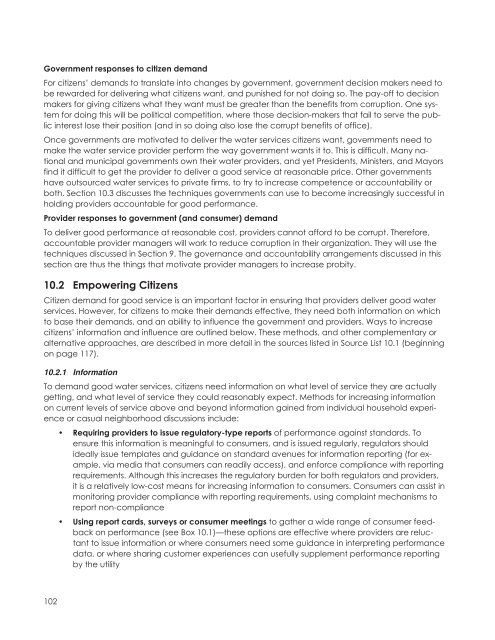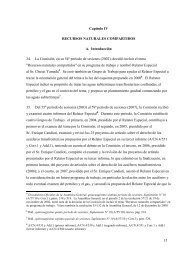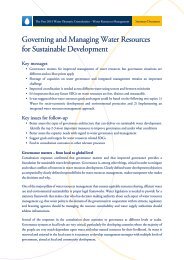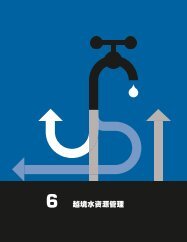A Sourcebook - UN-Water
A Sourcebook - UN-Water
A Sourcebook - UN-Water
You also want an ePaper? Increase the reach of your titles
YUMPU automatically turns print PDFs into web optimized ePapers that Google loves.
Government responses to citizen demand<br />
For citizens’ demands to translate into changes by government, government decision makers need to<br />
be rewarded for delivering what citizens want, and punished for not doing so. The pay-off to decision<br />
makers for giving citizens what they want must be greater than the benefits from corruption. One system<br />
for doing this will be political competition, where those decision-makers that fail to serve the public<br />
interest lose their position (and in so doing also lose the corrupt benefits of office).<br />
Once governments are motivated to deliver the water services citizens want, governments need to<br />
make the water service provider perform the way government wants it to. This is difficult. Many national<br />
and municipal governments own their water providers, and yet Presidents, Ministers, and Mayors<br />
find it difficult to get the provider to deliver a good service at reasonable price. Other governments<br />
have outsourced water services to private firms, to try to increase competence or accountability or<br />
both. Section 10.3 discusses the techniques governments can use to become increasingly successful in<br />
holding providers accountable for good performance.<br />
Provider responses to government (and consumer) demand<br />
To deliver good performance at reasonable cost, providers cannot afford to be corrupt. Therefore,<br />
accountable provider managers will work to reduce corruption in their organization. They will use the<br />
techniques discussed in Section 9. The governance and accountability arrangements discussed in this<br />
section are thus the things that motivate provider managers to increase probity.<br />
10.2 Empowering Citizens<br />
Citizen demand for good service is an important factor in ensuring that providers deliver good water<br />
services. However, for citizens to make their demands effective, they need both information on which<br />
to base their demands, and an ability to influence the government and providers. Ways to increase<br />
citizens’ information and influence are outlined below. These methods, and other complementary or<br />
alternative approaches, are described in more detail in the sources listed in Source List 10.1 (beginning<br />
on page 117).<br />
10.2.1 Information<br />
To demand good water services, citizens need information on what level of service they are actually<br />
getting, and what level of service they could reasonably expect. Methods for increasing information<br />
on current levels of service above and beyond information gained from individual household experience<br />
or casual neighborhood discussions include:<br />
• R equiring providers to issue regulatory-type reports of performance against standards. To<br />
ensure this information is meaningful to consumers, and is issued regularly, regulators should<br />
ideally issue templates and guidance on standard avenues for information reporting (for example,<br />
via media that consumers can readily access), and enforce compliance with reporting<br />
requirements. Although this increases the regulatory burden for both regulators and providers,<br />
it is a relatively low-cost means for increasing information to consumers. Consumers can assist in<br />
monitoring provider compliance with reporting requirements, using complaint mechanisms to<br />
report non-compliance<br />
U sing report cards, surveys or consumer meetings<br />
• to gather a wide range of consumer feedback<br />
on performance (see Box 10.1)—these options are effective where providers are reluctant<br />
to issue information or where consumers need some guidance in interpreting performance<br />
data, or where sharing customer experiences can usefully supplement performance reporting<br />
by the utility<br />
102
















